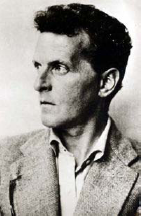Ludwig Wittgenstein (1889–1951) was an Austrian philosopher who worked at Cambridge University in England and is regarded as one of the most important thinkers of the 20th century. Here, he uses the way a child learns language to discuss the ways in which meanings are made through language. He starts with a quote from St Augustine.

These words, it seems to me, give us a particular picture of the essence of human language. It is this: the individual words in language name objects—sentences are combinations of such names. In this picture of language we find the roots of the following idea: Every word has a meaning. This meaning is correlated with the word. It is the object for which the word stands …
Let us imagine a language for which the description given by Augustine is right. The language is meant to serve for communication between a builder A and an assistant B. A is building with building stones: there are blocks, pillars, slabs and beams. B has to pass the stones … in the order in which A needs them. For this purpose they use a language consisting of the words ‘block’, ‘pillar’, ‘slab’, ‘beam’. A calls them out; B brings the stone which he has learned to bring at such and such a call. Conceive this as a complete primitive language …
But what about this: is the call ‘Slab!’ … an sentence or a word? … because if you shout ‘Slab!’ you really mean ‘Bring me a slab’. But how do you do this: how do you mean that while you say ‘Slab!’? How do you say the unshortened sentence to yourself? … For what goes on in you when you give such an order? Are you conscious of its consisting of four words while you are uttering it? Of course you have a mastery of this language … but is this mastery of something that happens while you are uttering the sentence? …
Augustine does not speak of there being any difference between kinds of word. If you describe the learning of language in [the way be does,] you are, I believe, thinking primarily of nouns like ‘table’, ‘chair’, ‘bread’ and of people’s names, and only secondarily of the names of certain actions and properties; and of the remaining kinds of word as something that will take care of itself …
In [this particular] practice of the use of language one party calls out the words, the other acts on them. In instruction in language, the following process will occur: the learner names the objects, that is he utters the word when the teacher points to the stone. And there will be this simpler exercise: the pupil repeats the words after the teacher—both of these being processes resembling language … [However] the processes of naming the stones and repeating words after someone [is just one of many kinds of] language game …
Augustine, we might say, does describe a system of communication; only not everything that we call language is this system. And one has to say this in many cases where the question arises ‘Is this an appropriate description or not?’ The answer is: ‘Yes, it is appropriate, but only for this narrowly circumscribed region, not for the whole of what you were claiming to describe’ …
[T]he term ‘language-game’ is meant to bring into prominence the fact that the speaking of language is part of an activity, or a form of life … [M]eaning can be defined thus: the meaning of word is its use in the language …
And now, I think we can say: Augustine [only] describes the learning of human language as if a child did not understand the language and came into a strange country and did not understand the language of the country; that is, as if it already had a language, only not this one.
Wittgenstein, Ludwig. 1958. Philosophical Investigations. New York: Macmillan. pp. 2, 3, 8, 2, 5, 3, 11, 20, 15–16. || Amazon || WorldCat
